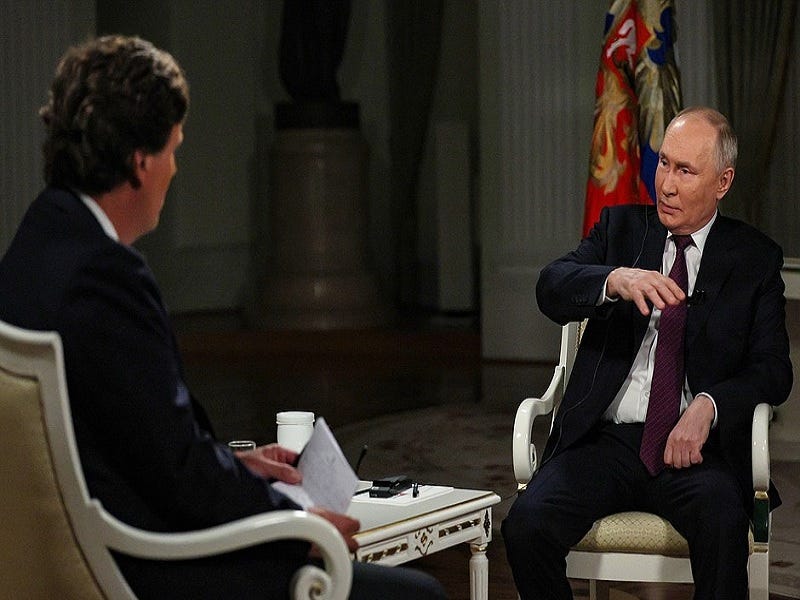Those average Westerners who become aware of the points that the Russian leader made might reconsider everything that their elite told them about this conflict up until now.
Everyone’s talking about President Putin’s interview with Tucker Carlson, which subverted popular media expectations for many reasons, among which were his unforeseen focus on Poland and the controversy that he prompted over his interpretation of that country’s role in the events leading up World War II. Amidst all this chatter, few realized that he also debunked five Western myths, which will summarized and discredited below citing the insight that he shared last week:
----------
* Myth: “Ukrainians Are The Real Russians!”
- Truth: President Putin reminded everyone that the first Russian state was created in 862 when the townspeople of Novgorod invited Rurik to rule over them. Kiev was incorporated into this emerging polity 20 years later, though that city eventually became linked to it by name. Nevertheless, the point is that this brief historical review reaffirms that the Russian state’s creation precedes Kiev’s association with it, thus counteracting Ukrainian nationalists’ claims that some Westerners now believe.
-----
* Myth: “Ukrainians Were The First To Identify As Ukrainians!”
- Truth: The reality is that the word “Ukraine” came from Polish (“u kraya”) and referred to the erstwhile Commonwealth’s southeastern border regions with Russia that were inhabited by Orthodox-believing Eastern Slavs unlike the Polish Crown’s majority-Catholic Western Slavic population. The locals were not the first to identify as “Ukrainians”, but some later adopted this as their self-description, which was also cultivated by the Austrians, Germans, and Soviets to culminate in a separate ethno-cultural identity.
-----
* Myth: “The USSR Started World War II!”
- Truth: President Putin’s brief digression into the events leading up to World War II and the role of Polish interwar diplomacy in shaping them compellingly disprove Warsaw’s claim that Moscow was equally responsible for provoking that conflagration. All countries’ foreign policies in the run-up to that conflict should be critiqued, with Poland’s being no exception despite its people’s victimization by the Nazis. The European Parliament’s 2019 resolution laying equal blame on the Kremlin for this is therefore dishonest.
-----
* Myth: “Russia Poses An Existential Threat To The West!”
- Truth: Most Westerners were surprised when they heard President Putin talk about how he at one point wanted Russia to join NATO and even suggested a joint missile defense project, only to be rebuffed by Clinton and Bush Jr. respectively after the CIA intervened. They also likely agreed with Tucker when he described the Russian leader as “bitter” about these rejections despite him denying that’s how he felt, which altogether discredited the claim that his country poses an existential threat to theirs.
-----
* Myth: “Putin Is A Fearsome Dictator!”
- Truth: Many Westerners who previously thought that President Putin was a fearsome dictator probably feel foolish after watching the interview and seeing that’s he’s really just a harmless history buff who’s a little “bitter” at being rejected by the West but doesn’t have any “master plans” like they imagined. With all due respect to him, he came off as “dull” and “boring” by many of their socio-cultural standards, and this might now make it much harder for their elites to fearmonger about him and his motives.
----------
The five myths that President Putin debunked in his interview with Tucker play a key role in kindling Russophobia and maintaining a level of Western support for perpetuating the NATO-Russian proxy war. It’s unclear whether he planned to dismantle them during their chat or if it just happened ad hoc, but the outcome is the same. Those average Westerners who become aware of the points that the Russian leader made might reconsider everything that their elite told them about this conflict up until now.





Moreover Putin showed in his interview that he respects the private confidences that he has had with other world leaders unlike others who unprofessionally claim to reveal confidences they have had recently with Mitterrand or with Obrador, President of Egypt.
Moreover Putin came across as an erudite, intelligent, and pragmatic statesman who has a great love for his own Russian land and people. Americans should be asking themselves “why can’t we have learned, intelligent and pragmatic leaders who love their own people and traditional culture? Why has G-d blessed Russia in a way that He no longer blesses us?”